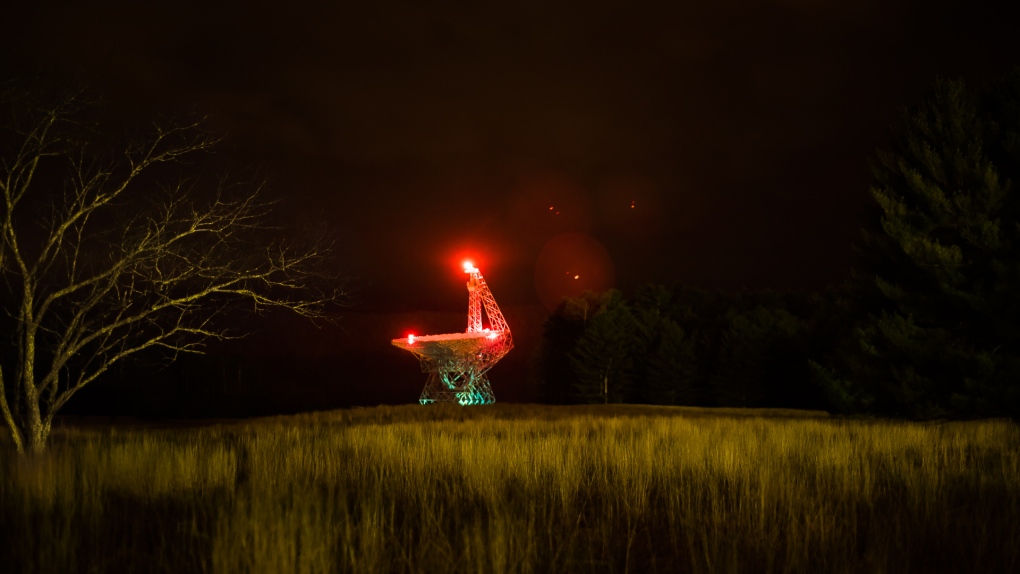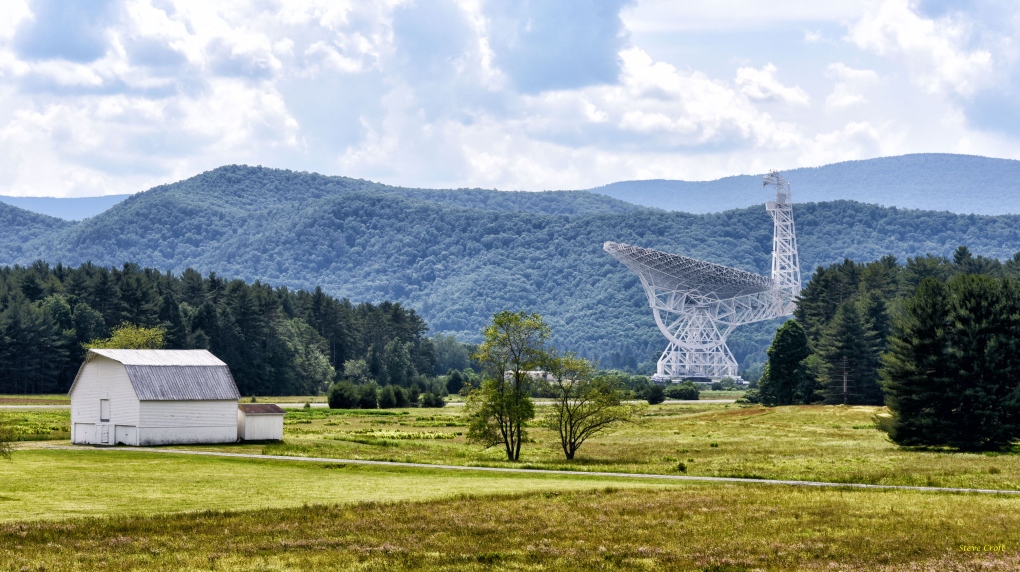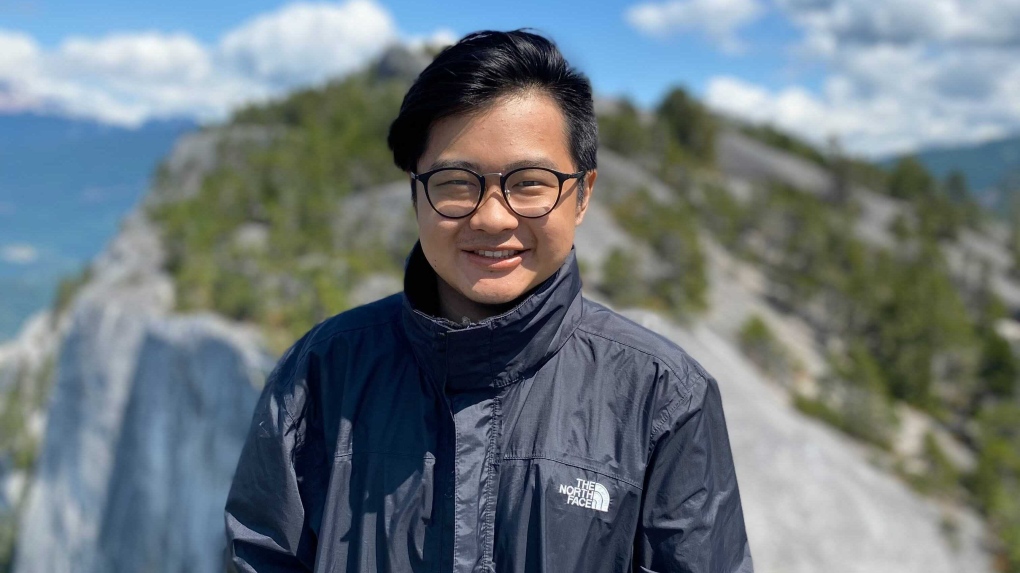Toronto student’s algorithm helps detect radio signals emitting from 5 distant stars
 An element of the Green Bank Telescope used to pinpoint radio signals from space is seen in this undated photograph. (Breakthrough Listen / Chris Schodt)
An element of the Green Bank Telescope used to pinpoint radio signals from space is seen in this undated photograph. (Breakthrough Listen / Chris Schodt)
A new artificial intelligence algorithm created by a Toronto student is helping researchers search the stars for signs of life.
Peter Xiangyuan Ma, a University of Toronto undergraduate student and researcher, said he started working on the algorithm while he was in Grade 12 during the pandemic.
“I was just looking for projects and I was interested in astronomy,” he told CTV News Toronto.
The idea was to help distinguish between technological radio signals created by human technologies and signals that were potentially coming from other forms of life in space.
“What we're looking for is signs of technology that signifies if the sender is intelligent or not. And so unsurprised to us, we keep on finding ourselves,” Ma explained. “We don't want to be looking at our own noisy signals.”
Using this algorithm, Ma said researchers were able to discover eight new radio signals being emitted from five different stars about 30 to 90 light years away from the Earth.
These signals, Ma said, would disappear when researchers looked away from it, which rules out, for the most part, interference from a signal originating from Earth. When they returned to the area, the signal was still there.
“We're all very suspicious and scratching our heads,” he said. “We proved that we found things that we wanted to find … now, what do we do with all these? That's another separate issue.”
- Download our app to get local alerts on your device
- Get the latest local updates right to your inbox
Steve Croft, Project Scientist for Breakthrough Listen on the Green Bank Telescope, the institute whose open source data was the inspiration for Ma’s algorithm, said that finding radio signals in space is like trying to find a needle in a haystack.
“You've got to recognize the haystack itself and make sure that you don't throw the needle away as you're looking at the individual pieces of hay,” Croft, who collaborated on Ma’s research, told CTV News Toronto.
 An image of the Green Bank Telescope is seen here. (Credit Breakthrough Listen / Steve Croft)
An image of the Green Bank Telescope is seen here. (Credit Breakthrough Listen / Steve Croft)
Croft said algorithms being used to discover these signals have to account for multiple characteristics, including the position they are coming from in the sky and whether or not the transmission changes over time, which could indicate if it’s coming from a rotating planet or star.
“The algorithm that Peter developed has enabled us to do this more efficiently,” he said.
The challenge, Croft says, is recognizing that false positives may exist despite a signal meeting this criteria. What could be signs of extraterrestrial life may also just be a “weirdly shaped bit of a haystack,” he added.
“And so that's why we have to go back and look again and see if the signal still there. And with these particular examples that Peter found with his algorithm, the signal was not there when we pointed the telescope back again. And so we sort of can't say one way or another, is this genuine?”
Researchers have been searching the sky for technologically-generated signals since the 1960s, searching thousands of stars and galaxies for signs of intelligent life. The process is called “SETI,” or “the Search for Extraterrestrial Intelligence.”
But interference from our own radio signals has always proven to be a challenge. Croft says most pieces of technology have some kind of Bluetooth or wireless wave element that creates static, resulting in larger amounts of data needed to be collected.
“That's a challenge but also computing provides the solution,” he said.
“So the computing and particularly the machine-learning algorithms gives us the power to search through this big haystack, looking for the needle of an interesting signal.”
Ma said that while we may not have found a “technosignal” just yet, we shouldn’t give up. The next step would be to employ multiple kinds of search algorithms to find more and more signals to study.
 Peter Ma is seen in this photograph taken in 2021. (Adar Kahiri)
Peter Ma is seen in this photograph taken in 2021. (Adar Kahiri)
While the “dream” is to find evidence of life, Ma says he is more focused on the scientific efforts of actively looking for it.
This sentiment is echoed by Croft, who said he is most fascinating in working towards answering the question of whether humans are alone in this universe.
“I don't show up to work every day, thinking I'm going to find aliens, but I do show up for work. So you know, I've got sort of some optimism.”
CTVNews.ca Top Stories

Police arrest 3 Indian nationals in killing of B.C. Sikh activist Hardeep Singh Nijjar
Three people have been arrested and charged in the killing of B.C. Sikh activist Hardeep Singh Nijjar – as authorities continue investigating potential connections to the Indian government.
Five areas Canada's foreign interference commissioner says needs more investigation
Commissioner Marie-Josee Hogue released her interim report examining foreign election interference on Friday. Here are five elements of the issue that Hogue says she needs to further probe before she can make conclusions or recommendations.
Police officer hit by driver of fleeing vehicle in Toronto
York Regional Police say they are continuing to search for a suspect in an auto theft investigation who was captured on video running over a police officer in Toronto last month.
Why your airfare may be getting more expensive
Skyrocketing airfare prices are linked to heightened competition and rising food and fuel, according to the CAA.
TD worst-case scenario more likely after drug money laundering allegations: analyst
TD Bank Group could be hit with more severe penalties than previously expected, says a banking analyst after a report that the investigation it faces in the U.S. is tied to laundering illicit fentanyl profits.
New weight-loss drug Wegovy not a 'magic bullet,' doctor warns
As Wegovy becomes available to Canadians starting Monday, a medical expert is cautioning patients wanting to use the drug to lose weight that no medication is a ''magic bullet,' and the new medication is meant particularly for people who meet certain criteria related to obesity and weight.
Drew Carey is never quitting 'The Price Is Right'
Drew Carey took over as host of 'The Price Is Right' and hopes he’s there for life. 'I'm not going anywhere,' he told 'Entertainment Tonight' of the job he took over from longtime host Bob Barker in 2007.
Funeral today for broadcasting legend and voice of 'Hockey Night in Canada' Bob Cole
A funeral is being held today for hockey broadcasting legend Bob Cole in his hometown of St. John's, N.L.
Foreign meddling 'did not affect' overall federal election results: inquiry report
Foreign interference by China did not affect the overall results of the 2019 and 2021 general elections won by Justin Trudeau's Liberals, a federal commission of inquiry has found.































